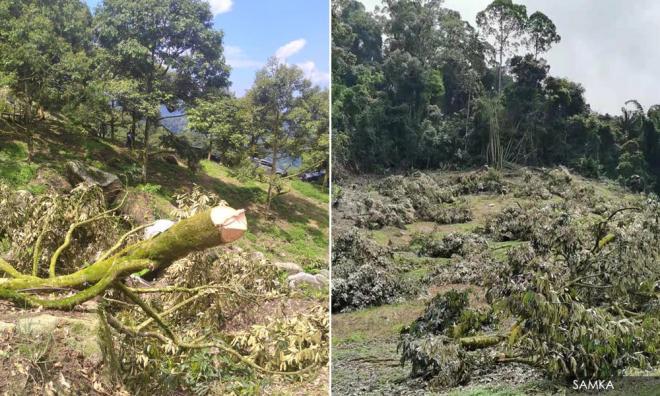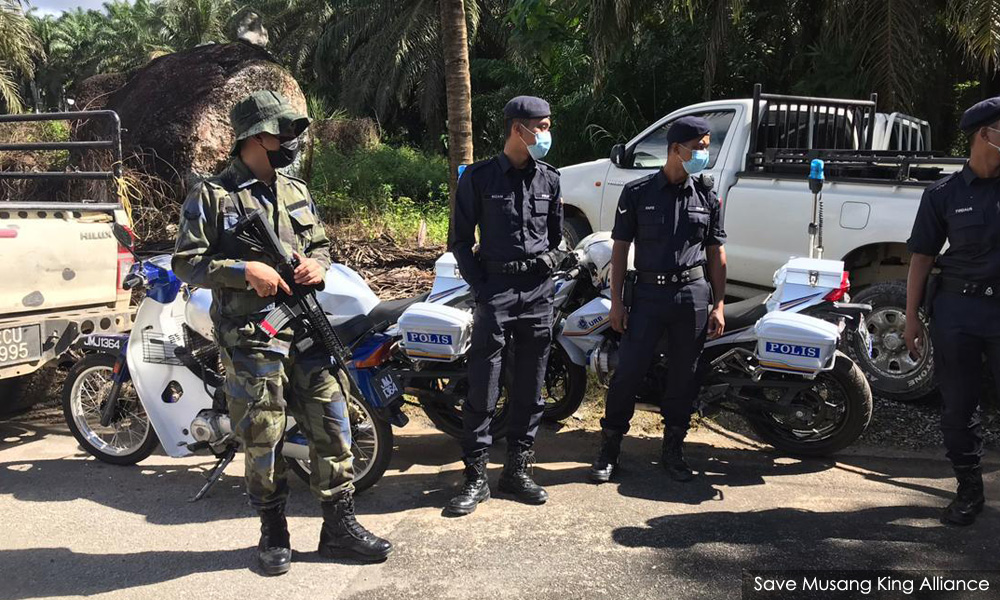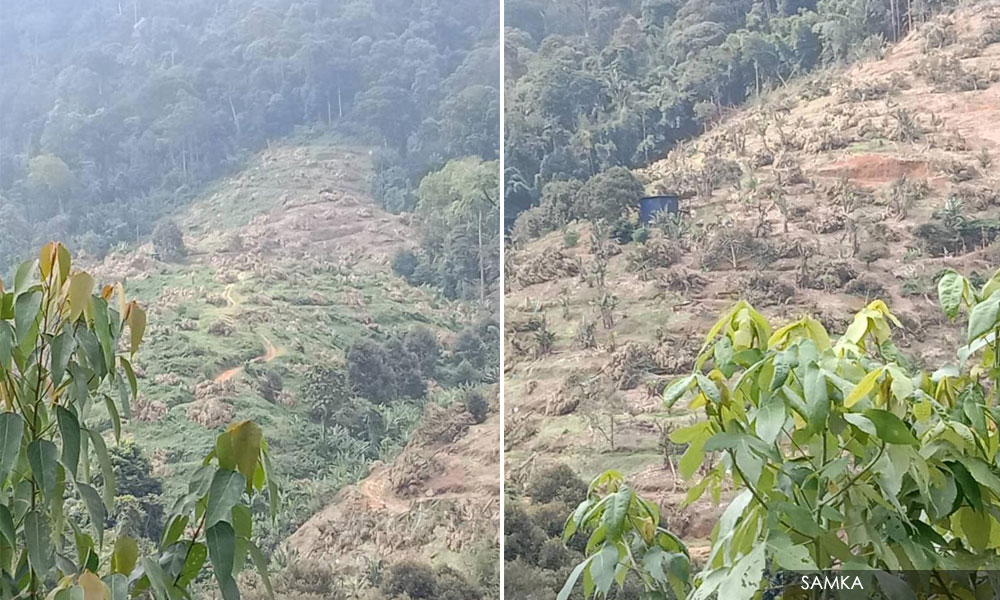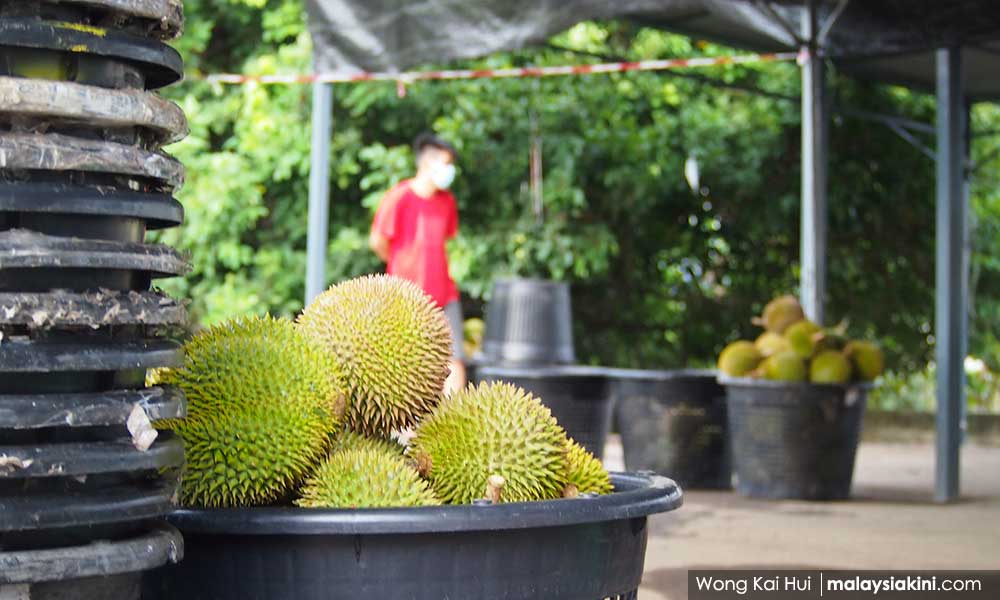
How do you make normally “relaxed” civil servants work super hard?
Pahang may have found the “secret formula” for this - tell them that they are “saving the environment” This was the supposed “noble cause” that led the state’s forestry department to boast they had chopped down 15,000 mature durian trees in record time.
The General Operations Force (GOF) were also there to enforce this new-found “passion” to go green. Why, it almost seemed that the durian farmers were like “eco-terrorists” that had to be deterred by men wearing army uniforms and toting machine guns. What a “fantastic” show of force!
So, can all Malaysians rest assured that our forests, rivers and coral reefs will be protected from now on? And that this blessed land will be nature’s paradise reborn?
But sad to say, eco protection may just be a green fig leaf to cover up baser instincts. As is well known by now, a consortium called Royal Pahang Durian Resources-PKPP (a joint venture between a palace-linked company and a state government agency) wants to take over the valuable musang king farms all around Raub on terms that the farmers describe as “exploitation”. If the farmers are right, then it’s just a greedy desire to ride on years of other people’s hard work.

This consortium combines the power of royalty with the state government, and that may be the real reason why the 15,000 durian trees were cleared with lightning speed with backup from men carrying machine guns - to show “who’s the tuan or master” in this dispute, rather than trying to work out a fair solution.
Better solutions
Even if we assume that the forestry department is sincere, why chop down the trees now? When Malaysians are suffering from a double Covid and economic crisis (caused by our bumbling leaders)? Can’t it wait till after the pandemic? This seems like the first time in Malaysian history that official eco protection has been so “urgent”.
Those in power claim that farmers had planted the musang king durian trees illegally on forest reserve land. Firstly, that ignores the government’s old promise to give land to farmers in exchange for settling a dangerous area when communists were roaming the hills.
Secondly, even if the farmers don’t legally own the land, surely the decent thing to do was to harvest and sell the expensive durians, then donate the money to those waving white flags around the country. Why destroy precious trees when people are starving?
This durian charity can be done for the whole pandemic, or until the court case over the land is resolved. If this is “too much work” for the forestry folks, then cooperate with the farmers on a compromise solution to donate part of the sales to charity.
Or why not put the land under the temporary management of the most bumi of the bumiputras? Yes, allow the Orang Asli to have a windfall by harvesting the fruits. These are examples of win-win solutions, rather than the “I’m more powerful and I’m gonna destroy everything just to spite you” attitude. What happened to the “kerajaan prihatin” (caring government) slogan?

Photos show that the cleared area has steep hill slopes. While a durian plantation is not a forest, at least the tree roots hold the soil together. The forestry people say they want to plant timber trees, but the young saplings will take years to grow. Won’t that mean massive soil erosion, with rivers becoming the colour of teh tarik, in the meantime?
As hikers, one of the attractions we look forward to are fruits from wild durian trees in the jungle. Earlier this year, I helped the Malaysian Nature Society plant durian trees to “enrich” the Urban Community Forest in Kuala Lumpur.
In other words, durian trees are also part of our forest, not unnatural aliens such as fancy pine trees from Europe. If “reforestation” is the goal, why not plant those little timber saplings in between the musang king trees? Perhaps some durian trees can be cut to make more space, but why whack the whole hillside till it’s botak (bald)?
Greenwashing greed
The local assemblyperson Chow Yu Hui exposed the hypocrisy by pointing out that the Pahang government leased out 1,213ha of nearby land to the royal consortium, and the forest there was then chopped down and replaced with durian trees - even though the area was a water catchment area and a habitat for our tigers which are close to extinction.
The charge of hypocrisy rings true because Pahang has been notoriously poor in eco protection. Three infamous projects have dogged the state over the years - bauxite mining (which covered areas near Kuantan in red dust), a toxic waste disposal site for Lynas and most recently, mining near Tasik Chini, a Unesco Biosphere Reserve.
Sorry to say, all three projects involved… the Pahang royal family. Ampun Tuanku, beribu-ribu ampun (thousands of apologies your highness), patik is a mere humble journalist who does not want to be disloyal. But please, can we stop projects that harm the environment?
Over the decades, much of Pahang’s once extensive forests have been lost to logging. When driving along the East Coast Highway, it pains me to see even steep hills being stripped bare to make way for oil palm, including areas near the fabulously scenic Berkelah waterfalls. Can’t they at least spare the steep slopes? Must they grab everything?

In 2015, logging was linked to a disastrous landslide along the Karak highway. Then in 2016, part of the Lesong forest next to the Endau-Rompin State Park was devastated by clear cutting even though it’s the home of endangered tigers and elephants. And I was heartbroken to see photos showing the destruction of the once pristine Ulu Tembeling area near Taman Negara.
To complicate matters, some loggers claim to have “surat kuning”, so-called “yellow letters” indicating palace sanction. How did this culture of “surat kuning” take root in Pahang?
While profits go into private pockets, it’s the public that is forced to bear the losses from massive soil erosion and flooding. When Temerloh was under water early this year, did the loggers (and the politicians that enabled them) compensate residents for the damages and hardship?
With Pahang’s poor record, it’s laughable when “eco protection” is used by the state authorities to justify cutting down 15,000 beautiful and productive durian trees. This is not a whitewash, but a greenwash, to conceal the less noble agendas behind the whole musang king fiasco.
ANDREW SIA is a veteran journalist who likes teh tarik khau kurang manis. You are welcome to give him ideas to brew at tehtarik@gmail.com
Pahang may have found the “secret formula” for this - tell them that they are “saving the environment” This was the supposed “noble cause” that led the state’s forestry department to boast they had chopped down 15,000 mature durian trees in record time.
The General Operations Force (GOF) were also there to enforce this new-found “passion” to go green. Why, it almost seemed that the durian farmers were like “eco-terrorists” that had to be deterred by men wearing army uniforms and toting machine guns. What a “fantastic” show of force!
So, can all Malaysians rest assured that our forests, rivers and coral reefs will be protected from now on? And that this blessed land will be nature’s paradise reborn?
But sad to say, eco protection may just be a green fig leaf to cover up baser instincts. As is well known by now, a consortium called Royal Pahang Durian Resources-PKPP (a joint venture between a palace-linked company and a state government agency) wants to take over the valuable musang king farms all around Raub on terms that the farmers describe as “exploitation”. If the farmers are right, then it’s just a greedy desire to ride on years of other people’s hard work.

This consortium combines the power of royalty with the state government, and that may be the real reason why the 15,000 durian trees were cleared with lightning speed with backup from men carrying machine guns - to show “who’s the tuan or master” in this dispute, rather than trying to work out a fair solution.
Better solutions
Even if we assume that the forestry department is sincere, why chop down the trees now? When Malaysians are suffering from a double Covid and economic crisis (caused by our bumbling leaders)? Can’t it wait till after the pandemic? This seems like the first time in Malaysian history that official eco protection has been so “urgent”.
Those in power claim that farmers had planted the musang king durian trees illegally on forest reserve land. Firstly, that ignores the government’s old promise to give land to farmers in exchange for settling a dangerous area when communists were roaming the hills.
Secondly, even if the farmers don’t legally own the land, surely the decent thing to do was to harvest and sell the expensive durians, then donate the money to those waving white flags around the country. Why destroy precious trees when people are starving?
This durian charity can be done for the whole pandemic, or until the court case over the land is resolved. If this is “too much work” for the forestry folks, then cooperate with the farmers on a compromise solution to donate part of the sales to charity.
Or why not put the land under the temporary management of the most bumi of the bumiputras? Yes, allow the Orang Asli to have a windfall by harvesting the fruits. These are examples of win-win solutions, rather than the “I’m more powerful and I’m gonna destroy everything just to spite you” attitude. What happened to the “kerajaan prihatin” (caring government) slogan?

Photos show that the cleared area has steep hill slopes. While a durian plantation is not a forest, at least the tree roots hold the soil together. The forestry people say they want to plant timber trees, but the young saplings will take years to grow. Won’t that mean massive soil erosion, with rivers becoming the colour of teh tarik, in the meantime?
As hikers, one of the attractions we look forward to are fruits from wild durian trees in the jungle. Earlier this year, I helped the Malaysian Nature Society plant durian trees to “enrich” the Urban Community Forest in Kuala Lumpur.
In other words, durian trees are also part of our forest, not unnatural aliens such as fancy pine trees from Europe. If “reforestation” is the goal, why not plant those little timber saplings in between the musang king trees? Perhaps some durian trees can be cut to make more space, but why whack the whole hillside till it’s botak (bald)?
Greenwashing greed
The local assemblyperson Chow Yu Hui exposed the hypocrisy by pointing out that the Pahang government leased out 1,213ha of nearby land to the royal consortium, and the forest there was then chopped down and replaced with durian trees - even though the area was a water catchment area and a habitat for our tigers which are close to extinction.
The charge of hypocrisy rings true because Pahang has been notoriously poor in eco protection. Three infamous projects have dogged the state over the years - bauxite mining (which covered areas near Kuantan in red dust), a toxic waste disposal site for Lynas and most recently, mining near Tasik Chini, a Unesco Biosphere Reserve.
Sorry to say, all three projects involved… the Pahang royal family. Ampun Tuanku, beribu-ribu ampun (thousands of apologies your highness), patik is a mere humble journalist who does not want to be disloyal. But please, can we stop projects that harm the environment?
Over the decades, much of Pahang’s once extensive forests have been lost to logging. When driving along the East Coast Highway, it pains me to see even steep hills being stripped bare to make way for oil palm, including areas near the fabulously scenic Berkelah waterfalls. Can’t they at least spare the steep slopes? Must they grab everything?

In 2015, logging was linked to a disastrous landslide along the Karak highway. Then in 2016, part of the Lesong forest next to the Endau-Rompin State Park was devastated by clear cutting even though it’s the home of endangered tigers and elephants. And I was heartbroken to see photos showing the destruction of the once pristine Ulu Tembeling area near Taman Negara.
To complicate matters, some loggers claim to have “surat kuning”, so-called “yellow letters” indicating palace sanction. How did this culture of “surat kuning” take root in Pahang?
While profits go into private pockets, it’s the public that is forced to bear the losses from massive soil erosion and flooding. When Temerloh was under water early this year, did the loggers (and the politicians that enabled them) compensate residents for the damages and hardship?
With Pahang’s poor record, it’s laughable when “eco protection” is used by the state authorities to justify cutting down 15,000 beautiful and productive durian trees. This is not a whitewash, but a greenwash, to conceal the less noble agendas behind the whole musang king fiasco.
ANDREW SIA is a veteran journalist who likes teh tarik khau kurang manis. You are welcome to give him ideas to brew at tehtarik@gmail.com
Lynas sudah OK? This blog has gone completely silent on that.
ReplyDelete